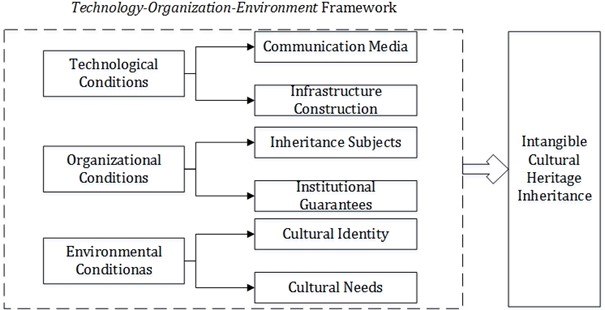Research on the Realization Path of Intangible Cultural Heritage Inheritance from the Perspective of Public Cultural Services: A Case Study of Yao Long-Drum Dance in S Town
Abstract
Against the backdrop of constructing a modern public cultural service system, the intangible cultural heritage (ICH) inheritance faces multiple challenges, including the aging of inheritors, superficial application of technology, and weakening of cultural identity. Taking the Yao ethnic group's Long Drum Dance in S Town, G Province, as a typical case, this study systematically analyzes the internal mechanism and practical paths of ICH inheritance based on the Technology-Organization-Environment (TOE) framework. The research reveals that: the technology dimension breaks through the temporal and spatial barriers of inheritance through media innovation and spatial reconstruction, promoting the transformation of ICH from "closed skills" to "open resources"; the organization dimension relies on multi-stakeholder collaboration and institutional embedding to form a closed-loop link of "skill inheritance - knowledge dissemination - value transformation", breaking the dilemma of resource fragmentation; the environment dimension reconstructs the social legitimacy of ICH through cultural meaning re-production and dynamic adaptation to needs, promoting its upgrading from "static protection" to "dynamic evolution." On this basis, the study further proposes a "technology empowerment - organization collaboration - environment activation" holistic improvement path, emphasizing the need to achieve a systematic breakthrough in the living heritage of ICH through in-depth application of digitalization, optimization of the stakeholder network, and cultivation of the cultural ecosystem.
References
Ding, Y. Z. (2020). Research on systematic protection policies and measures for intangible cultural heritage during the "14th Five-Year Plan" period. Management World, 36(11), 22-35. https://doi.org/10.19744/j.cnki.11-1235/f.2020.0166
Duan, Y. W., & Zheng, Y. (2015). Social participation in the protection of intangible cultural heritage in the "post-application era". Cultural Heritage, (05), 1-10+157.
Guo, Y. P., & Jia, L. L. (2023). From glocalization to local globalization: Protection and inheritance of intangible cultural heritage in the Internet era. Journal of Yunnan Normal University (Philosophy and Social Science Edition), 55(02), 125-133.
Liu, H., & Zhang, J. L. (2021). Exploring the path of inheritance and innovation of traditional culture using new media. Academic Journal of Zhongzhou, (08), 83-88.
Liu, Z. H., & Jiao, J. P. (2021). A new path for the integrated development of "intangible cultural heritage + tourism" in Shanghai cultural memory institutions under the scenario theory. Cultural Heritage, (02), 126-134.
Ma, Z. Y., Liu, Z. Y., & Liu, Y. Y. (2019). Several key issues in the protection concept of intangible cultural heritage in China. Journal of Folkloristics, (06), 39-46+157-158. https://doi.org/10.13370/j.cnki.fs.2019.06.005
Tao, J., & Yang, M. H. (2022). The integrated development of rural public cultural service system and rural tourism: Taking the reform of the general and branch library system in Deqing, Zhejiang as an example. Library Tribune, 42(02), 45-55.
Wang, R. G. (2021). Rural cultural revitalization and the value presentation of intangible cultural heritage. Journal of Jinan University (Social Science Edition), 31(02), 37-43+158.
Wang, Z. Y., & Li, J. R. (2023). Functions, mechanisms, and policy supply mechanisms of intangible cultural heritage empowering rural revitalization. Academic Exchange, (09), 159-172.
Xiao, Y. P., & Wang, W. J. (2019). Research on the "Xijiang Model" of intangible cultural heritage assisting rural revitalization. Cultural Heritage, (03), 23-28.
Xiao, P., & Zhang, W. X. (2024). Towards a "community of public cultural services": Innovation exploration and experience promotion of G Province public cultural service system. Library Tribune, 44(03), 11-19.
Zhang, B. F. (2017). Scientific development of industrialization of intangible cultural heritage in China. Gansu Social Sciences, (06), 244-248. https://doi.org/10.15891/j.cnki.cn62-1093/c.2017.06.040
Zhao, H. (2021). Research on the innovation system of rural public cultural services under the integration of culture and tourism. Economic Issues, (05), 111-116. https://doi.org/10.16011/j.cnki.jjwt.2021.05.016
Zhang, J., & Liao, J. Q. (2022). Chinese wisdom of social forces participating in the high-quality development of public cultural services—A review of the National Academic Symposium on Cultural Heritage and Cultural Development (2022). Library and Information Knowledge, 39(05), 12-19+30. https://doi.org/10.13366/j.dik.2022.05.012
Zhang, Y. N. (2022). Folk custom reconstruction and cultural self-consistency: An analysis of the "intangible cultural heritage-ization" process of Rushan Yangko in contemporary Jiaodong area. Journal of Guangxi University for Nationalities (Philosophy and Social Sciences Edition), 44(04), 145-151.


This work is licensed under a Creative Commons Attribution 4.0 International License.
Copyright for this article is retained by the author(s), with first publication rights granted to the journal.
This is an open-access article distributed under the terms and conditions of the Creative Commons Attribution license (http://creativecommons.org/licenses/by/4.0/).









1.png)














